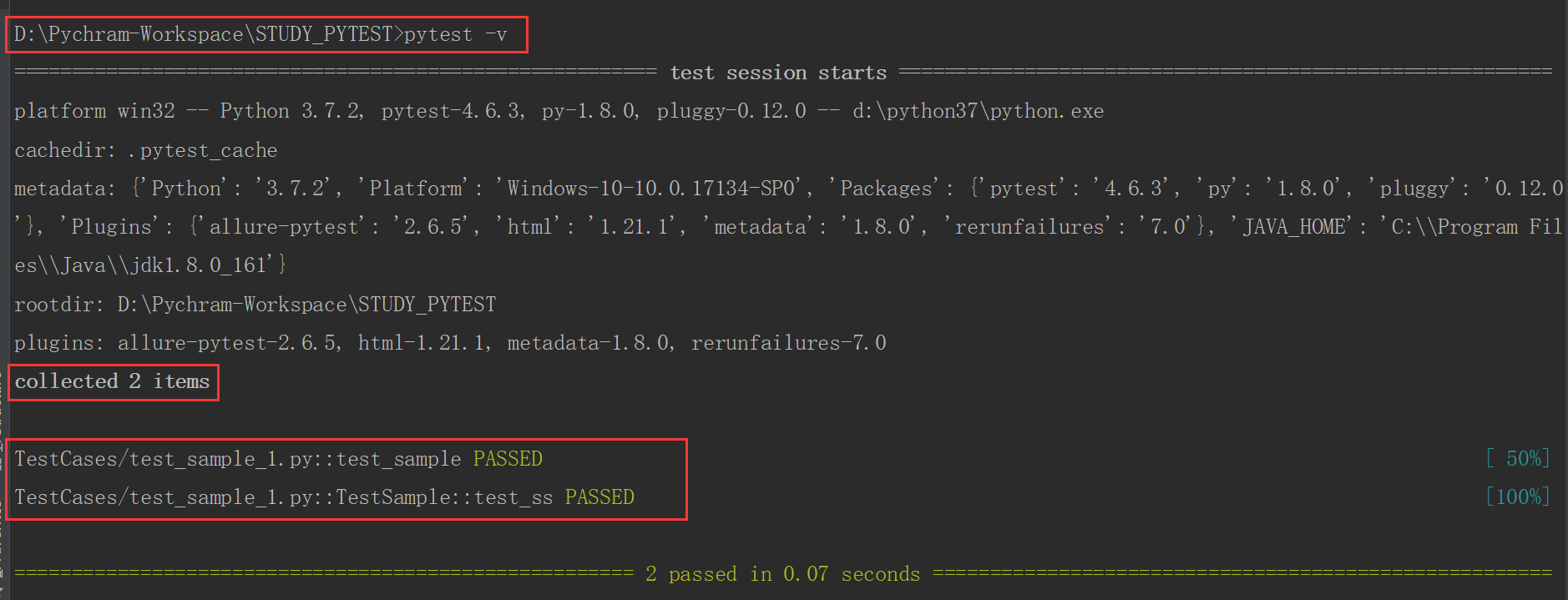pytest与unittest区别
pytest是python语言中一款强大的单元测试框架,用来管理和组织测试用例,可应用在单元测试、自动化测试工作中。
unittest也是python语言中一款单元测试框架,但是功能有限,没有pytest灵活。
就像:苹果电脑mac air 和mac pro一样。都是具备同样的功能,但是好用,和更好用。
本文包含以下几个内容点:
1)pytest的简单示例
2)pytest的安装
3)pytest的特征、与unittest的区别。
4) pytest如何自动识别用例。
5)pytest框架中,用例的运行顺序。
1)pytest写用例很简单,下面是一个简单的例子:
1 import random 2 3 4 def test_demo(): 5 assert 7 == random.randint(0,10)
运行结果如下:
============================= test session starts ============================= platform win32 -- Python 3.7.2, pytest-4.6.3, py-1.8.0, pluggy-0.12.0 rootdir: D:\Pychram-Workspace\STUDY_PYTEST plugins: allure-pytest-2.6.5, html-1.21.1, metadata-1.8.0, rerunfailures-7.0collected 1 item simple.py F simple.py:10 (test_demo) 7 != 6 Expected :6 Actual :7 ========================== 1 failed in 0.14 seconds ===========================
2)pytest的安装
安装命令:pip install pytest
3)pytest的特征、与unittest的区别。
pytest的特征如下:
3.1 自动识别测试用例。(unittest当中,需要引入TestSuite,主动加载测试用例。)
3.2 简单的断言表达:assert 表达式即可。(unittest当中,self.assert*)
3.3 有测试会话、测试模块、测试类、测试函数级别的fixture。(unittest当中是测试类、测试函数级别的fixture)
3.4 有非常丰富的插件,目前在600+,比如allure插件。(unittest无)
3.5 测试用例不需要封装在测试类当中。(unittest中需要自定义类并继承TestCase)
那么pytest是如何自动识别测试用例的呢?我们在编写pytest用例的时候,需要遵守哪些规则呢?
4) pytest如何自动识别用例
识别规则如下:
1、搜索根目录:默认从当前目录中搜集测试用例,即在哪个目录下运行pytest命令,则从哪个目录当中搜索;
2、搜索规则:
1)搜索文件:符合命名规则 test_*.py 或者 *_test.py 的文件
2)在满足1)的文件中识别用例的规则:
2.1)以test_开头的函数名;
2.2)以Test开头的测试类(没有__init__函数)当中,以test_开头的函数
示例:在D:\pycharm_workspace目录下,创建一个python工程,名为study_pytest。在工程下,创建一个python包,包名为TestCases。
在包当中,创建一个测试用例文件:test_sample_1.py。文件内容如下:
1 #!/usr/bin/python3
2 # -*- coding: utf-8 -*-
3 # Name: test_sample_1.py
4 # Author: 简
5 # Time: 2019/6/27
6
7 # 定义py文件下的测试用例
8 def test_sample():
9 print("我是测试用例!")
10
11 class TestSample:
12
13 def test_ss(self):
14 print("我也是测试用例!")
15
16 def hello_pytest(self):
17 print("hi,pytest,我不是用例哦!!")
按照上面定义的搜索规则,需要跳转到工程目录,然后再执行命令:pytest -v 。 执行结果如下:

让我们愉快的加进来第2个测试文件:test_sample_2.py,内容如下:
#!/usr/bin/python3
# -*- coding: utf-8 -*-
# Name: test_sample_2
# Author: 简
# Time: 2019/6/27
def add(a,*args):
sum = a
for item in args:
sum += item
return sum
def test_add_two_number():
assert 33 == add(11,22)
assert 55.55 == add(22.22,33.33)
def test_add_three_number():
assert 101 == add(10,90,1)
再次运行命令:pytest -v 得到如下结果:

通过多个用例文件的执行,可以看出用例的执行顺序。
5) pytest中用例的执行顺序
原则:先搜索到的py文件中的用例,先执行。在同一py文件当中,按照代码顺序,先搜索到的用例先执行。
转载自:https://www.cnblogs.com/Simple-Small




